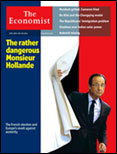Academy of Current Affairs (Online & Distance Learning)
|
|
|||
|
|
Economist magazine subscription offers in Pakistan
|
||
Pakistan's premier website that covers current affairs and news.
Foreign Affairs Magazine Subscription
House on Installments in Rawalpindi
Bloomberg Businessweek is home delivered in Pakistan
Honour Killing - a Hindu ritual
US at risk of a Chinese dollar dump?
At last count, China held slightly more than $1 trillion in U.S. Treasury securities. One fear has been that, should China and the United States engage in an economic war — as they clearly are now — those dollars could become a weapon against US, reports Time magazine.
The Chinese would sell dollars in foreign exchange markets, raising U.S. interest rates and perhaps triggering a serious American recession that might spread elsewhere. Is this possible? Well, yes. But it’s a long shot. Let’s see how a dollar dump might work.
China would sell a huge portion of its Treasury stake. This, in turn, would reduce the price of Treasurys — which, like stocks, are traded on the open market — and raise their interest rates. Consider a simplified example to see how this works.

Assume a $1,000 bond with a 5 percent interest rate. It guarantees a payment of $50 a year. But if the bond’s price has fallen to $800, that same promised $50 produces an interest rate of 6.25 percent.
Higher interest rates would then percolate through the U.S. economy, affecting consumer and business spending. If the reaction were powerful, a recession might result. Spending would weaken, unemployment would rise, and confidence would fall.
China’s dumping of Treasurys would escalate the economic conflict between the two countries. It would signal a second fundamental break with the post-World War II global economic system, with the first being President Trump’s aggressive use of tariffs. But two practical caveats arise.
First, the Chinese might be victims of their own policies. A global recession would reduce exports, compounding the effect of the 25 percent U.S. tariffs on $200 billion of Chinese exports. The dollar’s exchange rate might fall, while China’s renminbi might rise. The shift in exchange rates would weaken China’s competitive position. China’s sale of some U.S. Treasurys would also reduce the value of the Treasurys that aren’t sold
Why would the Chinese inflict these costs on themselves? Good question. Selling Treasurys “is perhaps the least potent weapon in its arsenal of potential retaliatory strikes against U.S. trade sanctions,” says economist Eswar S. Prasad of Cornell University. He doubts that China will do it.
The second caveat is the opposite of the first. It is that China might sell lots of Treasurys, and very little would happen. Interest rates would hardly budge. Already, China’s current account surplus — a broad measure of trade — has been shrinking, and this implies that China is accumulating fewer dollars than before. But that hasn’t sent interest rates soaring. They remain historically low. The rate on 10-year Treasurys is less than 2.5 percent
One explanation is that the world seems to have a huge appetite for U.S. Treasury securities, which are called “safe assets” by financial experts. This means that, despite all of the United States’ economic and political problems, investors don’t believe the United States would default on its government debt. Treasurys are a good place to leave idle funds.
The various possible consequences have led many observers to doubt that China would deliberately try to undermine the U.S. Treasury market. This is how Capital Economics, a forecasting firm, judged the prospects:
It “wouldn’t be sensible. If such a fire sale [of Treasury securities] drove up their yields [interest rates], China would lose money on its remaining holdings. It might also lead to greater instability in emerging financial markets. This includes China, which the authorities there want to avoid.”
David Smick, editor of the International Economy magazine, echoes this appraisal. Dumping Treasurys poses too many risks, including a global recession. “It’s a declaration of war — not just against the United States, but the world,” he says. “I don’t think the Chinese are going to do that.”
Whatever happens, the China story is undergoing significant revision. Not so long ago, its economy was growing at a rate of 10 percent a year. Now that’s slipped to about 6 percent , and many economists expect it to decline further. Derek Scissors of the American Enterprise Institute thinks it could drop to 4.5 percent this year, and as low as 1 percent to 2 percent within a decade.
There are many obstacles to faster growth. Debt is one. Although it spurred growth in the past, borrowing in China has now reached levels that look increasingly unsustainable. From 2005 to 2018, loans to Chinese nonfinancial corporations went from 112 percent of gross domestic product to 152 percent of GDP, reports the Institute of International Finance, an industry research and advocacy group
The resolution of this struggle is unclear. But, if nothing else, the collision between the Trump administration and Beijing heralds a new era in U.S.-China relations. Both countries are caught in contradiction, being in conflict and dependent on each other at the same time.
May 27, 2019
Also Read
Crisis to be over in two months: Imran
British Airways to resume Pakistan flights next week after a decade .
Theresa May to resign as prime minister
Zakir Musa: India's 'most wanted' killed in Kashmir
Share your views at feedback@newsflash.com.pk
Top stories
NAB allowed to grill Nawaz inside jail in vehicles case
Send your contributions at editor@newsflash.com.pk



